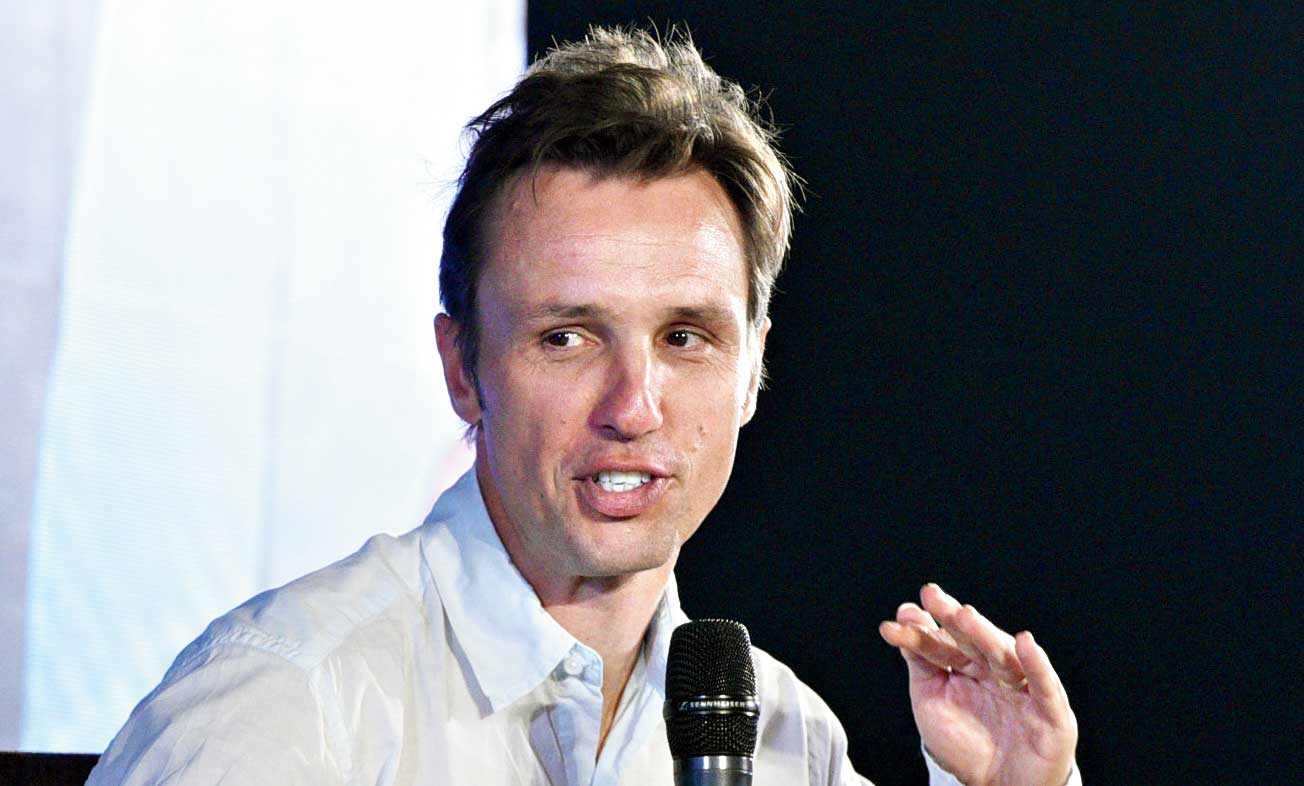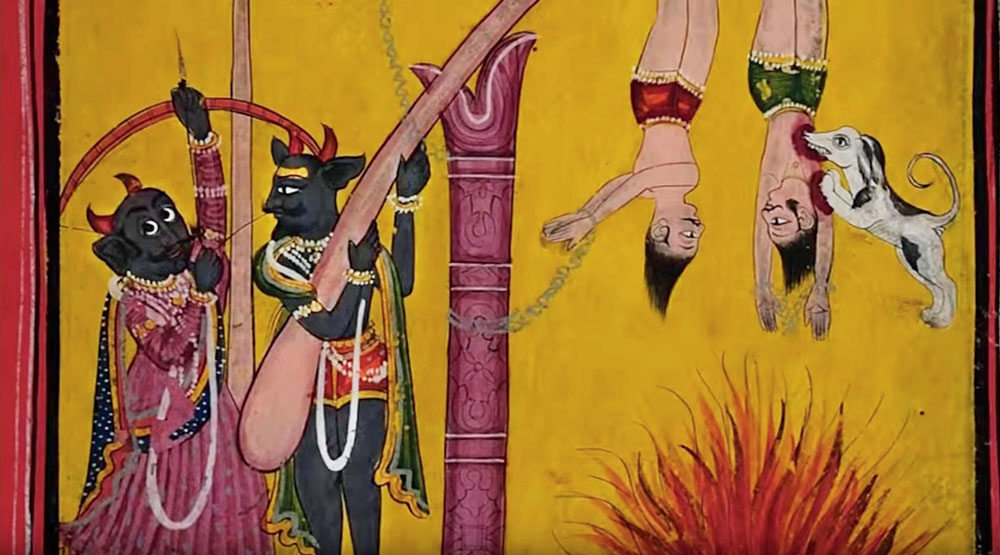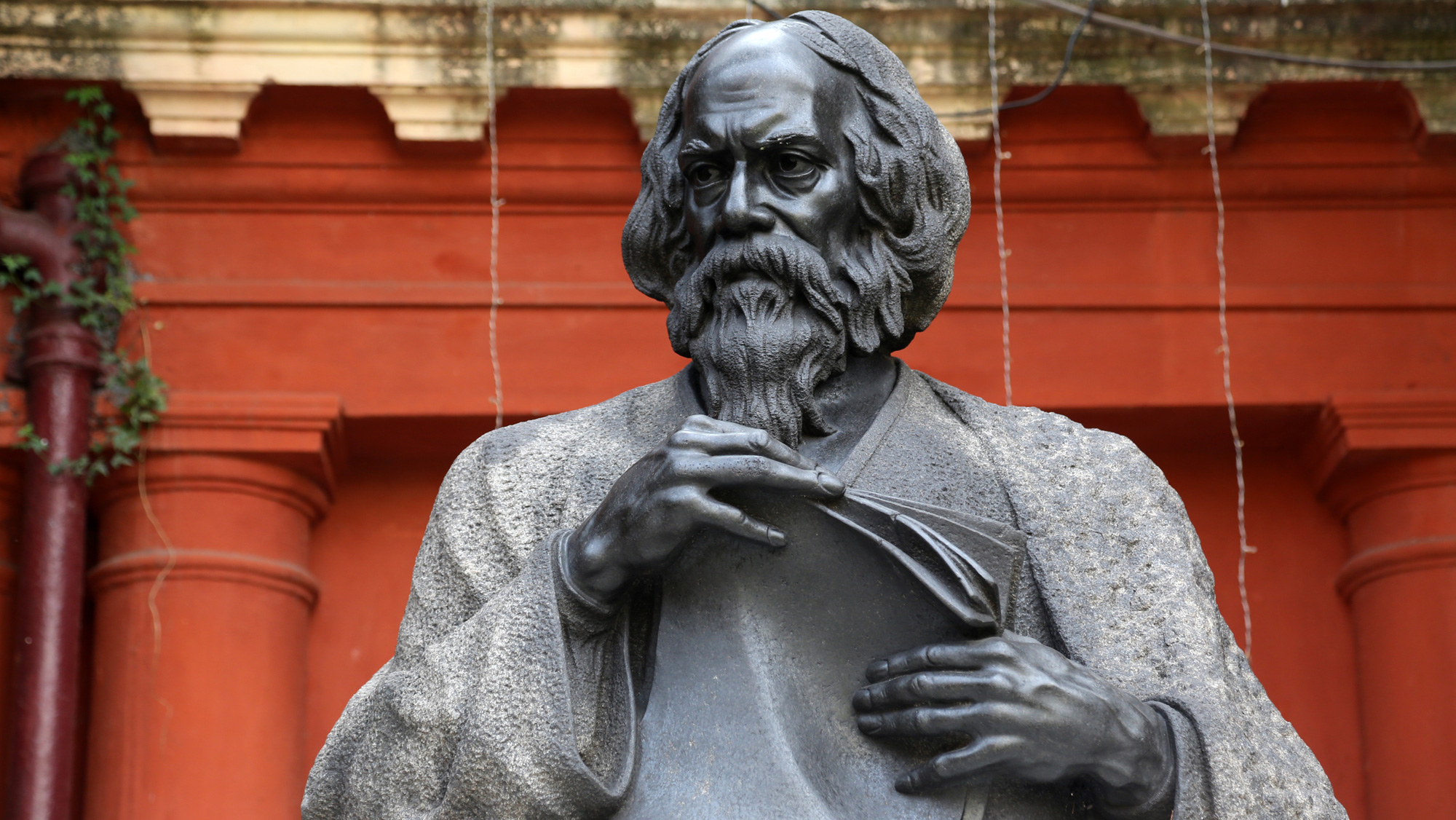He believes that writing Bridge of Clay (2018) almost killed him and the multitude of colours present in his books is because he loves “seeing” things around him. Markus Zusak, the award-winning Australian author who thought he wrote a book which no one would ever read and ended up giving us The Book Thief (2005), was a part of the literati that has descended upon Calcutta for The Tata Steel Kolkata Literary Meet (Kalam 2019) hosted at Victoria Memorial Hall in association with The Telegraph. He believes that the only way to write is to “bet everything that you have”.
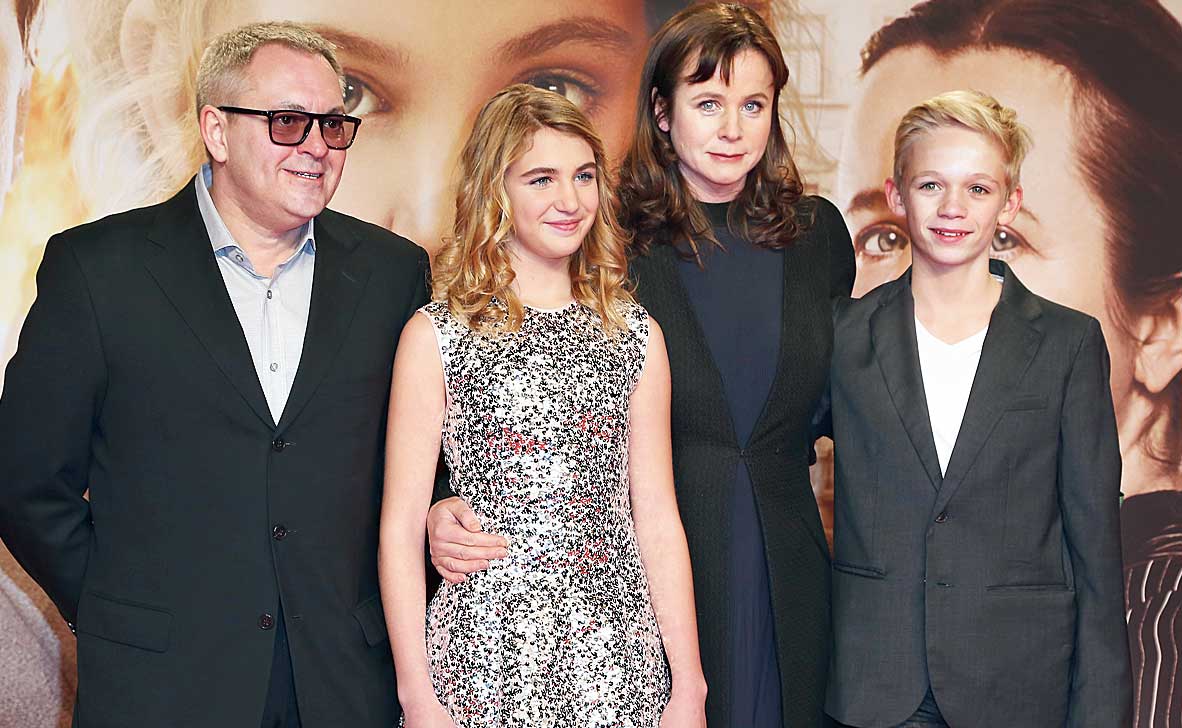
The cast and crew of The Book Thief — (l-r) Brian Percival, Sophie Nelisse, Emily Watson and Nico Liersch — at the premiere in Germany Agency picture
The Book Thief (2005), a novel for young-adults, has now been translated in more than 30 languages, adapted on stage at the venerable Steppenwolf Theatre in 2012 and made into a film in 2013. The film was directed by Brian Percival, starring Geoffrey Rush, Emily Watson and Sophie Nelisse and it went on to be nominated in various categories at the British Academy Film Awards, Golden Globe Awards, and the Academy Awards. The story of a young German girl, narrated by Death, who steals books in Nazi Germany while her family hides a Jewish refugee in her basement, found resonance among the young and old alike.
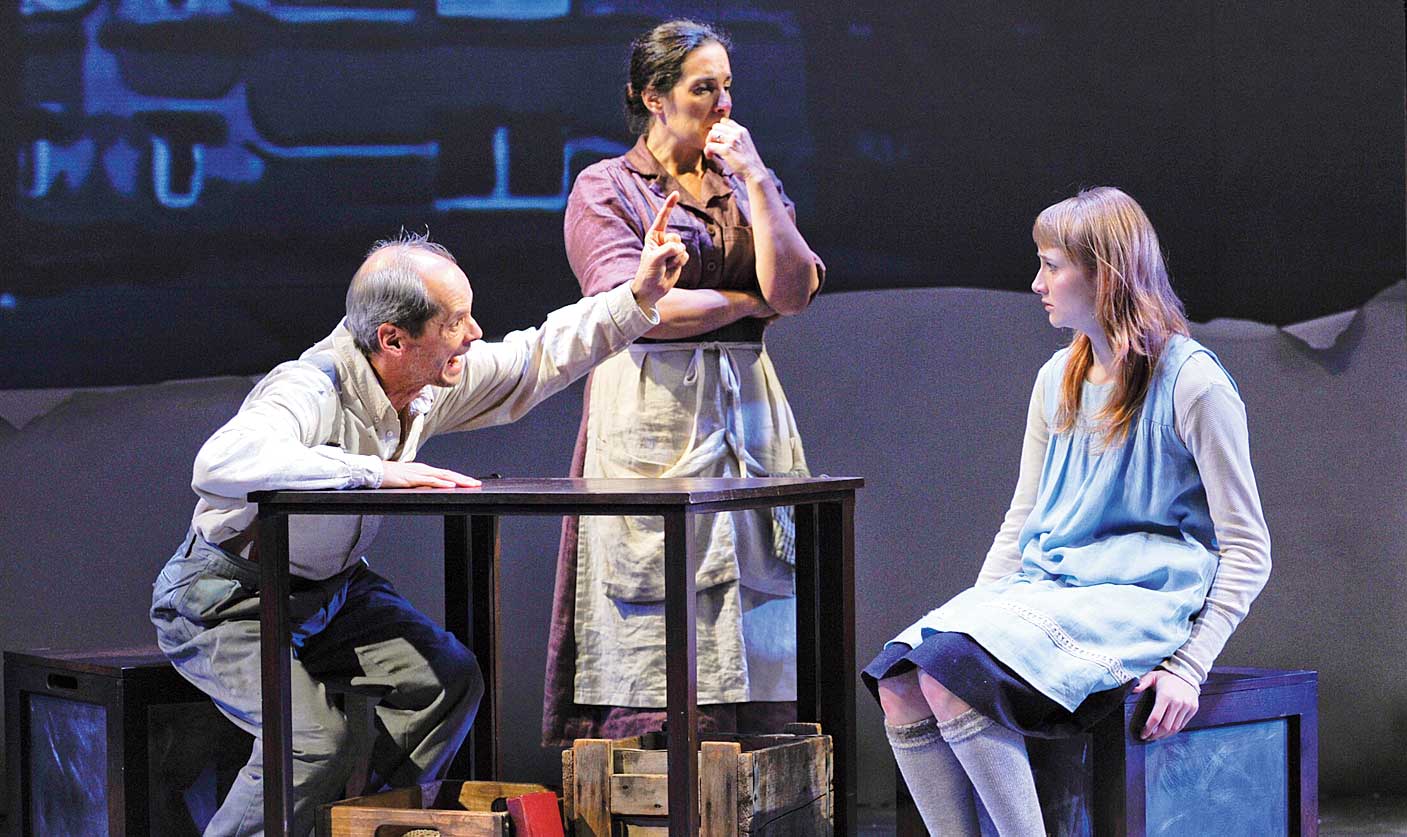
A scene from the stage production of The Book Thief at Steppenwolf Theatre in Chicago Agency picture
At his session at Kalam 2019 on January 22, he was in conversation with author Sandip Roy about what, being an author really means. “You need to repeatedly ask yourself why you do what you do,” said Zusak, whose sentences are punctuated with smiles just as frequently as there are moments of poignancy in his books.The author is in India as part of Australia Fest, a six-month-long celebration of Australian culture and creativity.
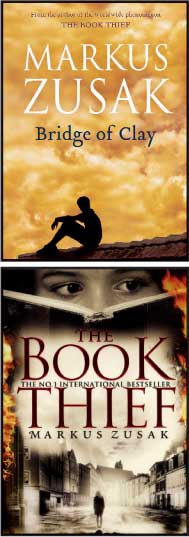
Zusak’s books have been translated in over 30 languages (Book covers)
The story of five brothers who brought themselves up, Bridge of Clay had one brother Clay building a bridge for his family. The author is clueless about where the idea of construction of a bridge came from. “Was it the Sydney Harbour Bridge? It could be,” he smiles again. “I didn’t know what kind of bridge Clay would go on to build when I started writing. But I did know that it would have a part of him and that is where the name of the book comes from,” said Zusak.
t2 sat down for a long chat with the author at Taj Bengal, on the morning of his first session. The conversation felt like stepping into his private world where existed a strange sense of bewildering fulfilment that the author perhaps felt for himself and his works. Excerpts:
Tell us about your childhood.
I am the youngest of four kids and my mum and dad were from Germany and Austria, which was a bit unusual in the part of Sydney where I grew up. I had a very Australian upbringing but I also had these great stories that my parents would tell us. We played cricket and rugby in the backyard at the same time they were telling us these stories; a piece of Europe would come into our house. I feel like I was spoilt because of the amount of time I got to spend with my mom and dad as a teenager. That’s a more meaningful age than when you are very, very young. Their love of storytelling washed off on me.
When did you know you wanted to be a writer?
I was 16 and I just loved reading novels. I loved the idea of reading something — you know the story is not true but while you are inside it, you believe it. That’s what I loved and that’s what I wanted to do with my life. I tried to write my first book then and those eight pages could be entered into a competition for the worst book ever written. But you have to start somewhere.
How did you conceptualise The Book Thief?
I had published about four books and written almost eight of them before that, which never saw the light of day. I think some books have a really grand plan but there’s an element in every book where you feel surprised. With The Book Thief, I thought I was going to write a very short, 100-page novella but it turned into a 590-page book. But that doesn’t mean I didn’t plan it. Once I brought Death in as the narrator, I thought ‘Oh, now it’s going to be around 250 pages!’ and then it sort of just grew.
The smart thing I did was that I wrote about 200 pages at one go without actually reading it. I was happy with it but when I read it later, I thought, ‘God this needs so much work’! And then you start the process of reworking and re-writing and really planning properly. I knew that it was going to have 10 parts and each part was going to have eight chapters. I think I had periods that were very fruitful and some that were barren. It took about one-and-a-half years to write the first half of that book and then it took about a month to write the second half because I was just ready and aware.
Did you worry about the morbidity that would get associated with the book the moment you decided to make Death the narrator?
I found quite a fun way to write. I am obviously a very emotional writer but I think my greatest emotion is when I am thinking about it beforehand. When I actually start writing it, I feel like there is a little part of me that is watching the process from the outside and that enables me to do what I have to do. I wasn’t worried because I thought no one was going to read it. And I think that allowed me to do everything that I wanted to do with it, everything I needed to do and I could be very free. I love the idea that when you are a writer you can’t just bet half of what you’ve got. Bet everything because that’s what every book should be.
So, do you consciously think this when you are writing? Is there never an audience in mind?
I think there is a point where you have to say to the audience ‘Well, I have looked after you long enough, I have tried to keep you reading, I have tried to do everything to help you, and now you have to come with me’. Sometimes you have to risk putting your audience off but you have to cross the line between writing for the audience and writing for the characters involved and I think you have to do the latter justice first. And the irony of that is you’re not being dismissive of the audience, reality is that’s how you actually start to serve the audience, by truly following what you have to do. And I feel that’s what I did with The Book Thief and even more so with Bridge of Clay. The latter was a completely different challenge because while I knew no one was going to read The Book Thief, I knew a lot of people were waiting to read Bridge of Clay.
There is this idea The Book Thief is a book that everybody loves but that’s not true. It didn’t always get great reviews and not always do people say how much they love it. The more successful the book is or the more successful the person is, the more criticism they get as well. Everything is fickle except the one thing that you can control — the quality of writing and what you are trying to do. That’s what I am always reminding myself. To concentrate on the job at hand — to write the very best book it can be, in its own truth.
Where do you draw inspiration from?
I think it’s mainly talking to people. This year, for example, I want to talk to a lot of people about their jobs. I find people’s jobs quite interesting, specially working jobs like driving a truck. I think you can get some interesting stories out of that. In all of my books, the characters never work in offices. They are always trades people. I think that’s my background, people who go out there and work with their hands for a living. I think getting inspiration is a lot of different things. I think it’s reading, it’s watching films. Like while watching a movie, especially if I have watched the movie before, I’m also starting to dream a little bit. That’s where I get most of the inspiration from — being a part of the world and also have a part of me that’s dreaming.
You have said before that Leisel (The Book Thief) was inspired by your mother but that “she ceased to be so from the seventh or eighth page and became her own person”. Who did she become? What do you love about her? Is there a part of you in who she became?
I want to make sure I get this right so I am going to think about this for a moment. I think the answer is everything that she did that was completely hers, that appeared out of thin air. That could be her going out every morning to get the newspaper for Max to read or building a snowman in the basement or showing Rudy the book Max made. But mostly I think, it’s probably her strength I would say, just her ability to be courageous at moments when it would be easier not to be.
And is there no part of you in her?
Well there is a part of me in everything that I write. But I still think I write better than I am. (laughs) And I make characters who are better than I am. Books allow us to escape ourselves but not escape fully. You know, it’s almost like taking us to a place and imagining a better version of ourselves and what we aspire to be. That’s the part of me that is in all of my books, I think.
You weren’t so sure of finishing Bridge of Clay. What gave you the last push?
I think it’s just the idea that you don’t know what you have until it’s taken away from you and my wife actually made me quit writing Bridge of Clay after about 10 years. She said, “It’s not doing you any good. You need to get happy about writing it again in a week or you need to stop.” And that week came and went. I think I just realised, when I stepped back into it, that I’d already done 97 per cent of the work. It was just a matter of saying, ‘Yes it is hard and there is a lot going on with so many characters in the book. Maybe it will be a big failure, maybe it will be successful.” You just have to go in and do it. It is the joy of the struggle. It all doesn’t need to be perfect straight-away but you have to try. And that’s exactly what Clay is doing in that book.
How was the writing experience different from when you wrote The Book Thief?
It wasn’t too different. The big mistake I made was that I tried to write stringently from the beginning, so instead of writing 200 pages in one go, I would write a page and then work on it. Sometimes, it takes a while to know what you are doing or where you are going. It just took a little while longer to work out and it was because it was a very big world to arrive in. I was hard on myself with my day-to-day writing which I don’t think I need today. Now I know that the next thing I write, I am just going to sit down, understand and write and say to myself that it doesn’t have to be good. That is a different kind of discipline I feel, to say to yourself ‘This is okay, it doesn’t have to be great…yet’.
What is your day-today writing process like?
I like routines really, so I try to write in the morning, which gets harder when you have kids and pets and all. But I have a room at home where I work. The more space I have, the worse it is. I have a small room and I like to be there at the same time every day. But I will move from that room sometimes and work in the kitchen because I like a little bit of chaos. I work in a notebook a lot of the time and then I will type up. But usually I can type faster than I can write, like it is with everybody these days.
Is writer’s block real? Have you felt it?
I always feel like writer’s block is you sit down and you can’t write anything. But for me, it’s about a writer’s lack of faith. You are never happy with what you’ve got and you are never quite happy enough to move forward. And what’s the answer to that? I would just say to people who want to be writers that just take it easy on yourself. I think a lot of writers feel like they are lazy but there will be days when it is hard to be motivated. So somedays you just have to say ‘That’s enough’. It’s not like you don’t have plenty of other things that you have to do in your life and world. So how about you take a break and do some of that or just go to bed (laughs)!
There was a lot of conversation regarding the ‘Young Adult’ tag that was being given to The Book Thief. Do you personally believe that there is a particular age for a certain piece of literature?
I just know that there are certain books that I love, doesn’t matter what category they come from. Books transcend the category they come from. I think a lot of people want me to comment on young adult books and if they can read The Book Thief. I think they have proven that they can. It mostly has an adult audience although it’s in the YA section in America. Some other countries didn’t take up that idea.
For me, that’s all I am trying to do. I am trying to write someone’s favourite book. I mean who even uses that term ‘young adult’? Everytime I do a talk somewhere, there really is someone from every age, from a 11-year-old to a 91-year-old. I am happy for that audience and it doesn’t matter how old they are. Teenagers are always very heartfelt. They are always the ones who say how a book got them through a difficult period or how a book changed their life.
Do your kids read?
Yes, both my kids are big readers. Everybody has phases when they read a lot and then they absolutely don’t. My kids are readers, one is eight and the other is 12 and every now and then there will be a book that I will read to them after school or before bed. We are planning to do it this year because it’s been a while and this year I think it will be The Hobbit.
How do you think technology has affected the reading habits of people?
Sometimes I think about it and a lot of times, I don’t. I still think people are willing. There is something about books. Books are a lot like the cinema. People said, when videos came in, that cinema would die. But it is more video that’s become obsolete because of streaming and all that sort of thing. But if books were going to die, they’d be dead already. It’s true that we have less time because of technology to invest in books, I think they still mean something and deep in our hearts, we understand that. And I think we still need to connect with other people at a much deeper level and that’s why I think they have survived and they will survive.
What are you reading right now?
I have never read a Stephen King novel. So I am reading his novellas — Different Seasons, which has four different novellas.
Any new piece of work that moved you?
I think Emily Wilson’s new translation of The Odyssey. To me that’s been the most recent stand-out piece. Her intellect is quite mind-blowing. What I also loved about it is that a lot of attention is being given to the fact that she is the first woman to translate Homer and she completely shooed away the idea.
What next?
I have a few ideas that are starting to spring to the surface out of the barren wasteland that is my mind. (Says in one breath and breaks into laughter). I have a non-fiction one and a fiction one. I am just going to write for the love of it this year and see where it takes me.

